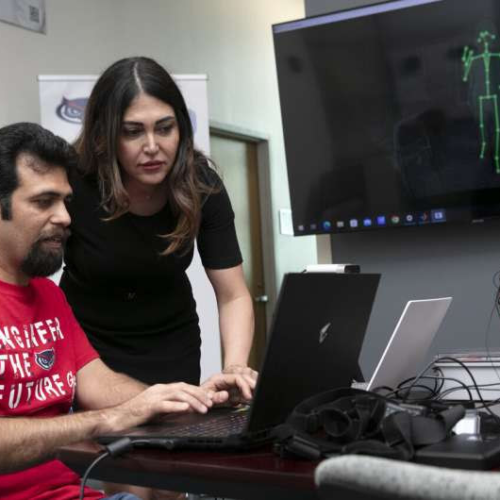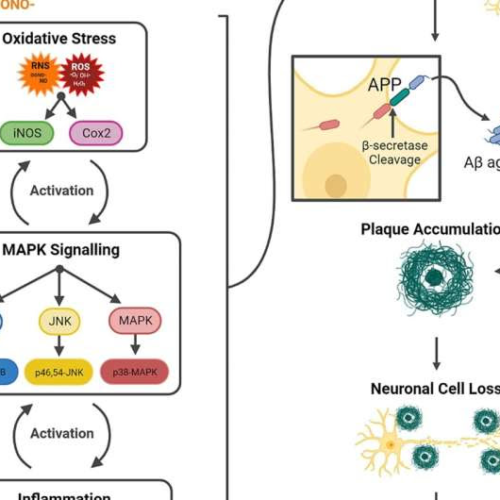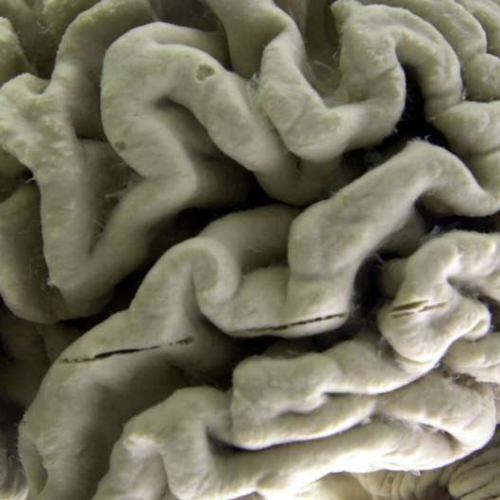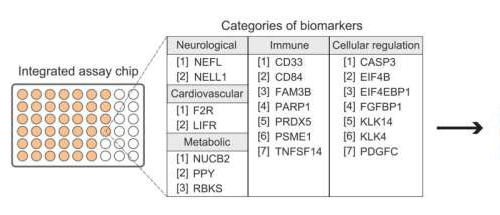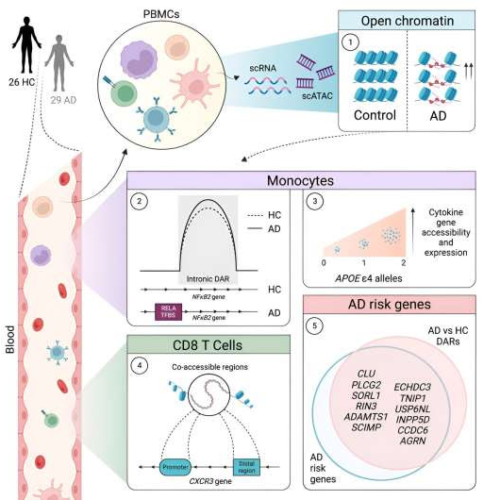by Florida Atlantic University Mahmoud Seifallahi (seated) and Behnaz Ghoraani, Ph.D., reviewing walking performance using a depth camera, which can detect and track 25 joints of body movement. Credit: Florida Atlantic UniversityA first-of-its-kind study suggests that to detect subtle gait impairments in older adults that often are prevalent in the early stages of cognitive decline,...
Category: <span>Alzheimer’s</span>
Tiny magnetic particles in air pollution linked to development of Alzheimer’s
by University of Technology, Sydney A working model on the biological effects of air pollutant particulates in the early onset pathologies of AD. Credit: Environment International (2024). DOI: 10.1016/j.envint.2024.108512Magnetite, a tiny particle found in air pollution, can induce signs and symptoms of Alzheimer’s disease, new research suggests. Alzheimer’s disease, a type of dementia, leads to memory...
Poor spatial navigation could predict Alzheimer’s disease years before the onset of symptoms
by University College London Credit: Pixabay/CC0 Public DomainPeople at risk of Alzheimer’s disease have impaired spatial navigation prior to problems with other cognitive functions, including memory, finds a new study led by UCL researchers. The research, published in Alzheimer’s & Dementia, used virtual reality to test the spatial navigation of 100 asymptomatic midlife adults, aged 43-66,...
Abdominal fat depots can impact brain health and cognition in individuals at high risk for Alzheimer’s disease
by Rutgers University Credit: Pixabay/CC0 Public DomainThe impact of abdominal fat on brain health and cognition is generally more pronounced in middle-aged men at high risk of Alzheimer’s disease than in women, according to researchers at Rutgers Health. In middle-aged individuals with a family history of Alzheimer’s disease, the amount of fat in their abdominal organs...
Researchers design novel drug delivery system that could reverse Alzheimer’s disease impact
by University of North Carolina at Chapel Hill Chirality inversion mechanisms. Scheme and TEM images (a) of Fmoc-FFFF-PEG2 prepared at RT, or heated to 37 and 40 °C to track the chirality inversion (50 nm scale bars). Schematic (b) of seeded growth via right-handed nucleation points. CD spectra (c) of nucleated assemblies grown with varying monomer:seed ratios. TEM...
Silent brain changes precede Alzheimer’s. Researchers have new clues about which come first
by Lauran Neergaard A closeup of a human brain affected by Alzheimer’s disease, is displayed at the Museum of Neuroanatomy at the University at Buffalo in Buffalo, N.Y., on Oct. 7, 2003. According to findings published Wednesday, Feb. 21, 2024 in the New England Journal of Medicine, Alzheimer’s quietly ravages the brain long before symptoms...
Team develops highly accurate universal diagnostic blood test for Alzheimer’s disease and mild cognitive impairment
by Hong Kong University of Science and Technology The research team has developed a revolutionary blood test for Alzheimer’s disease (AD) that can measure the levels of 21 proteins in multiple crucial biological pathways. The test can also calculate an AD risk score, enabling the evaluation of an individual’s AD status. Credit: Hong Kong University of...
Immune genes are altered in Alzheimer’s patients’ blood
by Northwestern University Credit: Neuron (2024). DOI: 10.1016/j.neuron.2024.01.013A new Northwestern Medicine study has found the immune system in the blood of Alzheimer’s patients is epigenetically altered. That means the patients’ behavior or environment has caused changes that affect the way their genes work. Many of these altered immune genes are the same ones that increase an...
Protein accumulation on fat droplets implicated in late-onset Alzheimer’s disease
by Kendall Daniels, University of North Carolina at Chapel Hill School of Medicine Credit: Wikimedia CommonsUNC School of Medicine researcher Sarah Cohen, Ph.D., and Ian Windham, a former Ph.D. student from the Cohen lab, have made a new discovery about apolipoprotein E (APOE)—the biggest genetic risk factor for late-onset Alzheimer’s disease. Older people who inherited a...
Scientists discover a potential way to repair synapses damaged in Alzheimer’s disease
by Buck Institute for Research on Aging The art depicts the recovery of the functional plasticity at synapses on neurons despite tau-induced toxicity in the brain. Credit: Larissa BrownWhile newly approved drugs for Alzheimer’s show some promise for slowing the memory-robbing disease, the current treatments fall far short of being effective at regaining memory. What...

